Gulf Studies
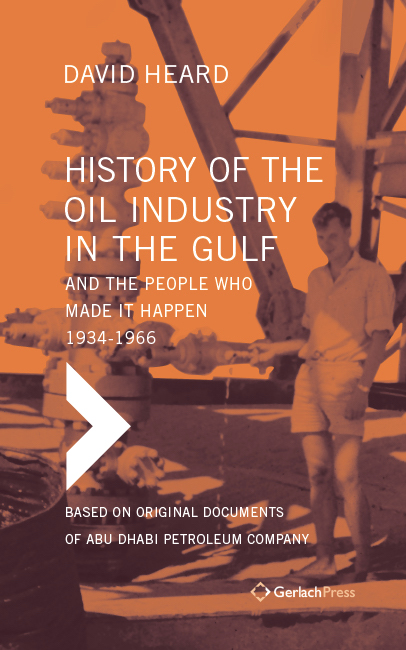
History of the Oil Industry in the Gulf and the People Who Made it Happen, 1934-1966
Based on Original Documents of Abu Dhabi Petroleum Company (Set of 5 Books in 6 Volumes, with Index)
David Heard – 2024-10
These volumes are a testament of the challenges contended by extraordinary men who initiated the search for oil in the United Arab Emirates in the years between the two World Wars. This set of a total of five books in six volumes features never-before-published copies of letters, notes and reports complementing the research, which stems from the archives of the Abu Dhabi Petroleum Company (ADPC) and other literature recorded by British Government officials. With rare photographs and maps alongside the author's ...
more »
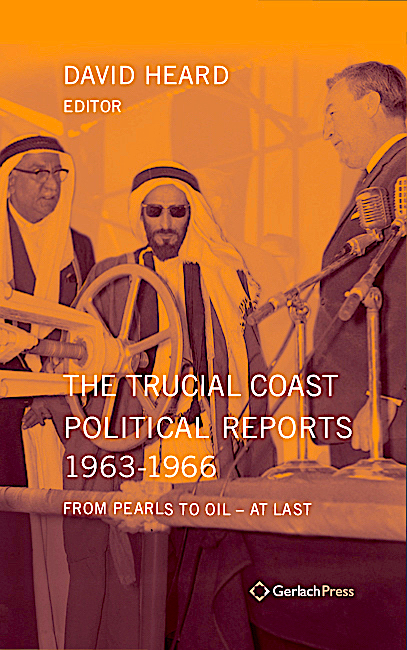
The Trucial Coast Political Reports 1963-1966
From Pearls to Oil - at Last. With an Index for vols 1-5
David Heard – 2024-10
The Trucial Coast Political Reports are a unique record of events, commented on by a small group of British men living in Sharjah and Dubai. This was in the years leading up to the commencement of oil exports from the desert of Abu Dhabi. These men regularly met to discuss and negotiate with the Rulers of the Trucial States - sometimes in a state of mutual incomprehension - the conditions under which the Company (Petroleum Development/ Trucial Coast or PD/TC) would operate in their various territories. Boundaries and fron...
more »
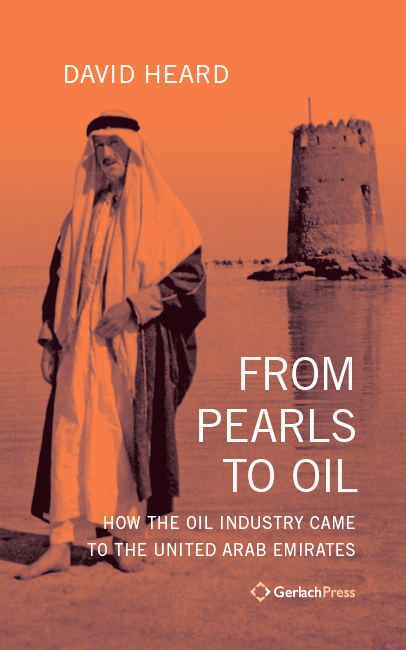
From Pearls to Oil
How the Oil Industry Came to the United Arab Emirates
David Heard – 2024-10
From Pearls to Oil is a testament of the challenges contended by extraordinary men who initiated the search for oil in the United Arab Emirates in the years between the two World Wars. This book features never-before-published copies of letters, notes and reports complementing the research, which stems from the archives of the Abu Dhabi Petroleum Company (ADPC) and other literature recorded by British Government officials. With rare photographs and maps alongside the author's in-depth narrative, this book is a...
more »
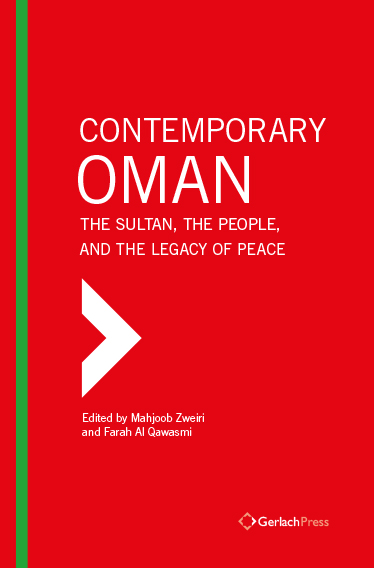
Contemporary Oman
The Sultan, the People and the Legacy of Peace
Mahjoob Zweiri, Farah Al Qawasmi (eds.) – 2024-11
At a time of rapid international change and marked regional dynamism, the Sultanate of Oman is emerging as a nation of surprising significance. Oman is a unique case of a Gulf state strategically and culturally located at a crossroads between the Indian Ocean, the Arabian Sea and the Persian Gulf. From this position, the Sultanate has developed its own political identity and pursued a unique foreign policy in the turbulent Middle East region, enabling the country to survive and overcome the challenges of the region. Over th...
more »
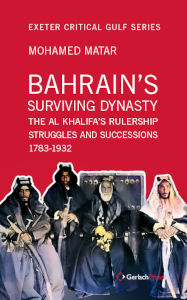
Bahrain’s Surviving Dynasty
The Al Khalifa’s Rulership Struggles and Successions 1783-1932
Mohamed Matar – 2023-06
The Al Khalifa of Bahrain is a long-standing dynasty that has established dispute resolution measures to overcome intra-tribal ambitions for power and wealth, replacing extra-constitutional rulership succession with primogeniture. Since their control over Bahrain began in 1783 until the British withdrawal from the Gulf in 1971, the Al Khalifa introduced ten senior ruling shaykhs, seven of whom experienced turbulent successions, and faced in-house rivalries and power-seeking disputes. This book provides valuable insights int...
more »
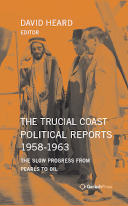
The Trucial Coast Political Reports 1958-1963
The Slow Progress from Pearls to Oil
David Heard – 2021
The Trucial Coast Political Reports are a unique record of events, commented on by a small group of British men living in Sharjah and Dubai. This was in the years leading up to the commencement of oil exports from the desert of Abu Dhabi. These men regularly met to discuss and negotiate with the Rulers of the Trucial States - sometimes in a state of mutual incomprehension - the conditions under which the Company (Petroleum Development/ Trucial Coast or PD/TC) would operate in their various territories. Boundaries and fronti...
more »
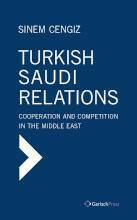
Turkish-Saudi Relations: Cooperation and Competition in the Middle East
Sinem Cengiz – 2020
Are the Middle East’s two heavyweights, Turkey and Saudi Arabia, friends or foes? What are the main drivers behind their rivalry or cooperation? The nature of their relationship has region-wide repercussions, affecting the calculations of both regional and global actors. This book is the first to offer a comprehensive and nuanced examination of the main drivers in the complex relationship between Turkey and Saudi Arabia, focusing on the role of domestic, regional and international dynamics. Three decades are examined: the ...
more »
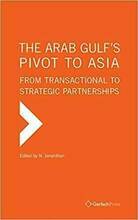
The Arab Gulf’s Pivot to Asia:
From Transactional to Strategic Partnerships
N. Janardhan (ed.) – 2020
Over the last two decades the relations between the countries of the Gulf and Asia have expanded beyond the economic domain to include political and even security arrangements. While oil and non-oil trade are still the fulcrum of their association, ‘strategic’ partnerships are fast becoming the norm. The contributors of this book argue that, along with economic diversification, the Gulf countries have also diversified their foreign policies, especially with China, India, Japan and South Korea, among others. Together with Ru...
more »
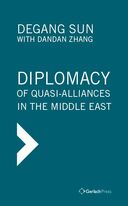
Diplomacy of Quasi-Alliances in the Middle East
with a foreword by Tim Niblock
Degang Sun, Dandan Zhang – 2020
Quasi-alliance refers to the ideation, mechanism and behavior of policy-makers to carry out security cooperation through informal political and security arrangements. As a “gray zone” between alliance and neutrality, quasi-alliance is a hidden national security statecraft. Based on declassified archives and secondary sources, this book probes the theory and practice of quasi-alliances in the Middle East. Four cases are chosen to test the hypotheses of quasi-alliance: - the Anglo-French-Israeli quasi-alliance during the Suez...
more »
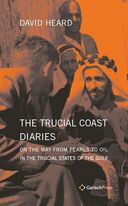
The Trucial Coast Diaries 1948-1957
On the Way from Pearls to Oil in the Trucial States of the Gulf
David Heard – 2020
The Trucial Coast Diaries are the secret reports written in Dubai by the Representatives of the London based group of oil companies, the Iraq Petroleum Company, known on the Trucial Coast as Petroleum Development (Trucial Coast), PD(TC). These men, the authors, were in a unique position to observe the social, economic and political environment of the people then living in the present day United Arab Emirates, before oil revenues led to a dramatic transformation from intense poverty to the great wealth which now permeates eve...
more »
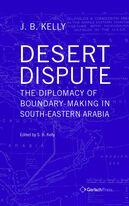
Desert Dispute: the Diplomacy of Boundary-Making in South-Eastern Arabia
Volume 3
J. B. Kelly – 2019
This is the third and final volume of a previously unpublished study by the foremost authority on the subject. The book is based on thorough research in the relevant archives and direct experience of the dispute. As such it will be the standard reference work on this question for all who have an interest in the Gulf Arab states, their territorial origins and its effects on their increasing role in regional and world affairs. The struggle to delineate the boundaries of south-eastern Arabia can claim to be one of the longest r...
more »
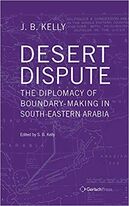
Desert Dispute: the Diplomacy of Boundary-Making in South-Eastern Arabia
Set, Volumes 1-3
J. B. Kelly – 2019
This new and previously unpublished study, by the foremost authority on the subject, is an exhaustive one, based on thorough research in the relevant archives and direct experience of the dispute. As such it will be the standard reference work on this question for all who have an interest in the Gulf Arab states, their territorial origins and its effects on their increasing role in regional and world affairs. The struggle to delineate the boundaries of south-eastern Arabia can claim to be one of the longest running diplomati...
more »
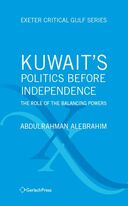
Kuwait's Politics Before Independence: The Role of the Balancing Powers
Abdulrahman Alebrahim – 2019
This book re-examines the historiography of constitutional development in Kuwait. It argues that existing scholarship on the subject has several shortcomings due to the lack of consideration given to the role played by some important social forces in the Kuwaiti political scene. Most historians working on Kuwait’s modern politics have focussed on two forces: the ruling family and the merchants. Although these two actors have undeniably been the most influential, other segments of society, such as the labour force, the villa...
more »
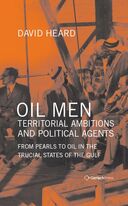
Oil Men, Territorial Ambitions and Political Agents. From Pearls to Oil in the Trucial States of the Gulf
Set, Volumes 1-2
David Heard – 2019
“Oil Men“ represents a unique resource for the student of the challenges, both physical and political, of oil prospecting in a region with no infrastructure and no formal boundaries between local power bases. The book charts the slow and unexpected transformation of the emirates from poverty to undreamed-of wealth. Detailed coverage with extensive access to primary sources describes the frequently tortuous negotiations between oil companies, sheikhs and regional political agents, all of whom sought to protect their different...
more »
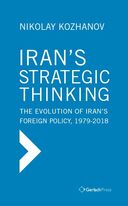
Iran’s Strategic Thinking:
The Evolution of Iran’s Foreign Policy, 1979-2018
Nikolay Kozhanov – 2018
What are the ideological motives behind Iran’s foreign policy? This new study examines Tehran’s twin desires to protect national interests and to project real power. Factors determining Iran’s foreign policy include: - Potential economic leader of the Middle East region - Key player in the oil and gas market - Centre of resistance against global Western domination - US and Israel policy - Syria as the bridge to Lebanon and Palestine There is a strong focus on primary sources, as well as interviews with EU, Russian and Middle...
more »
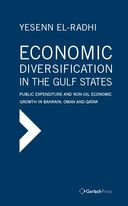
Economic Diversification in the Gulf States:
Public Expenditure and Non-Oil Economic Growth in Bahrain, Oman and Qatar
Yesenn El-Radhi – 2018
A long-standing economic policy goal of the oil-dependent states of the Gulf Cooperation Council is to increase economic diversification. Over the last decades, GCC governments fostered the development of non-oil economies through large-scale public investments in the stocks of human and physical capital. This book takes a new look at economic diversification efforts by examining the impact of different public expenditure categories (capital, education, health) on non-oil GDP and labour productivity developments in the three...
more »
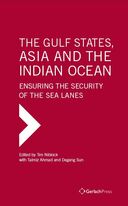
The Gulf States, Asia and the Indian Ocean: Ensuring the Security of the Sea Lanes
Tim Niblock, Talmiz Ahmad, Degang Sun (eds.) – 2018
Among the many strategic and economic issues facing the Gulf in the coming years, those relating to the Indian Ocean are set to be among the most challenging. In the re-ordering of global economic and political power which is currently underway, the Indian Ocean constitutes a key arena for regional and global competition and rivalry. With the leading Asian powers playing a more pro-active role in the region, sometimes with conflicting ambitions, and the United States intent on maintaining its established maritime hegemony th...
more »
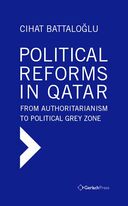
Political Reforms in Qatar: From Authoritarianism to Political Grey Zone
Cihat Battaloglu – 2018
In the past decade, Qatar has emerged as one of the world’s most proactive mediators in the international arena. It has also experienced a number of domestic changes to its economic infrastructure, welfare system and political system, along with material improvement in its citizens’ standard of living. Nonetheless, despite such radical and rapid advances, political reform in Qatar has proved to be relatively tentative. This book examines political reforms in Qatar from an analytical, normative and ideological perspective. It...
more »
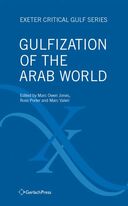
Gulfization of the Arab World
Marc Owen Jones, Ross Porter, Marc Valeri (eds.) – 2018
From projecting ideology and influence, to maintaining a notion of ‘Gulfness’ through the selective exclusion or inclusion of certain beliefs, cultures and people, the notion of Gulfization is increasingly pertinent as Gulf countries occupy a greater political and economic role in wider Middle East politics. This volume discusses the notion of Gulfization, and examines how thoughts, ideologies, way of life and practices are transmitted, changed, and transduced inside and outside the Gulf. From historical perspectives such as...
more »
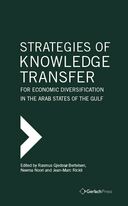
Strategies of Knowledge Transfer for Economic Diversification in the Arab States of the Gulf
Rasmus Gjedssø Bertelsen, Neema Noori, Jean-Marc Rickli (eds.) – 2017
Diversification is the principal economic objective for the Gulf States. The steep and sustained fall in oil prices over the last few years has added to the collective urgency to seek new sources of revenue. As such, the overriding theme of regional economic summits in recent years has focused on the question, “how do we transition to a knowledge-based economy?” This is the central question taken up by the contributors to this volume. A growing body of literature has begun to address how state policy in conjunction with univ...
more »
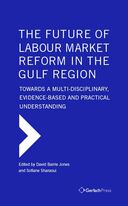
The Future of Labour Market Reform in the Gulf Region:
Towards a Multi-Disciplinary, Evidence-Based and Practical Understanding
David B. Jones, Sofiane Sahraoui (eds.) – 2017
As governments across the GCC strive to implement labour policies which accelerate the transition to "post oil" knowledge-based economies, this volume provides insights into the size of this challenge, along with analysis of progress to date. With a comprehensive coverage of the region (each GCC member is included in some respect), this new work provides unique insights into how the domestic policy agenda is shifting the region's moribund labour markets inexorably towards greater productivity, positivity, sust...
more »
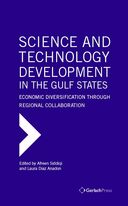
Science and Technology Development in the Gulf States:
Economic Diversification through Regional Collaboration
Afreen Siddiqi, Laura Diaz Anadon (eds.) – 2017
The Arab states of the Gulf, currently heavily reliant on oil and gas exports, have stated their intention to promote economic diversification and have embarked on reforming existing institutions for higher education, scientific research, and technology innovation. The region has witnessed huge population growth in recent decades, and in some cases (e.g. Saudi Arabia) almost half the population is under the age of twenty-five and in need of access to quality education and meaningful employment opportunities. This book provid...
more »
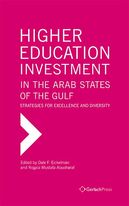
Higher Education Investment in the Arab States of the Gulf:
Strategies for Excellence and Diversity
Dale F. Eickelman, Rogaia Mustafa Abusharaf (eds.) – 2017
Over the last half-century, the GCC states have invested on a huge scale in higher education, but the stated commitment to internationally recognized excellence has also to come to terms with tradition. These pressure points are examined here in a number of comparative studies, and cover among other topics: higher education as soft power to promote regional or global influence, intense reliance on foreign instructors, citizen entitlements, badu and hadar divisions, gender separation, different visions of language of instruct...
more »
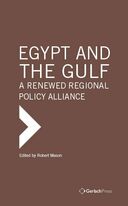
Egypt and the Gulf: A Renewed Regional Policy Alliance
Robert Mason (ed.) – 2017
Egypt continues to be cultural and political beacon in the Middle East. Its control of the Suez Canal, cold peace with Israel, concern about Gaza, mediation and interest in the Israel-Palestine conflict, and the marginalization of the Muslim Brotherhood are all points of significance. There is a close, and expanding, defence and security relationship between Egypt and the GCC states, most evident in the inclusion of Egypt in Saudi Arabia's new Sunni counter-terrorism alliance. The authors of this book contextualise hist...
more »
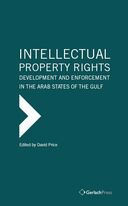
Intellectual Property Rights: Development and Enforcement in the Arab States of the Gulf
David Price, Alhanoof AlDebasi (eds.) – 2017
This volume includes a range of topics addressing aspects of the current status of intellectual property (IP) protection regimes in the Gulf Cooperation Council and its individual member states, and aspiring GCC members Jordan and Yemen. It examines the opportunities and challenges facing the GCC in becoming a real union with common, or at least harmonized, IP laws and regulations, while still allowing flexibility for domestic imperatives and interests. IP is a crucial part of commercial and trade activity which the GCC need...
more »
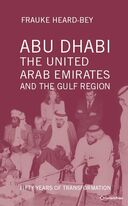
Abu Dhabi, the United Arab Emirates and the Gulf Region:
Fifty Years of Transformation
Frauke Heard-Bey – 2016
The unexpected decision of the British Government in January 1968 to withdraw its military and diplomatic protection from the Gulf catapulted the region into the limelight. For the following five decades the historian Dr. Frauke Heard-Bey was best placed to observe subsequent developments in the Gulf, having joined her husband David, a petroleum engineer, in Abu Dhabi in 1967. Through her role over decades in the Centre for Documentation and Research (now the UAE’s National Archive), Frauke Heard-Bey made use of its archives...
more »
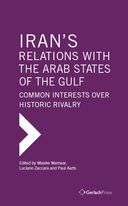
Iran's Relations with the Arab States of the Gulf:
Common Interests over Historic Rivalry
Maaike Warnaar, Luciano Zaccara, Paul Aarts (eds.) – 2016
GCC-Iran relations are at the heart of important political dynamics in the Middle East today. This is not limited to the ongoing disputes in the Gulf, one of the most important strategic locations globally. Iran and the GCC states also find themselves on opposing sides.in the Syrian and to some extent the Iraqi conflicts. This volume traces the origins of the troubled relations between Iran and the majority of the GCC monarchies. It discusses not only geostrategic rivalries, but also matters of identity which have been of in...
more »
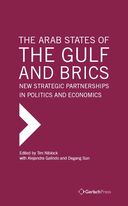
The Arab States of the Gulf and BRICS:
New Strategic Partnerships in Politics and Economics
Tim Niblock, Degang Sun, Alejandra Galindo (eds.) – 2016
How the Gulf Cooperation Council (GCC) relates to BRICS (Brazil, Russia, India, China, and South Africa) is, in the light of the growing strength and importance of this organisation and the countries which comprise it, of critical importance. The issue is not simply how the GCC countries handle their relations with the individual BRICS countries, but more importantly how they relate to an alternative structure of coordination and perhaps power in the global order. Their established links and alliances may no longer be enough...
more »
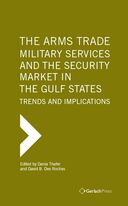
The Arms Trade, Military Services and the Security Market in the Gulf States: Trends and Implications
David B. Des Roches, Dania Thafer (eds.) – 2016
The Gulf is in the first rank of potential global flashpoints. It is the largest market for weapons imports in the world, and is considered to be a vital interest of all the great powers. Iran is viewed as an expansionist threat by the Arab states of the Gulf, who have built considerable militaries in a historically short timeframe. Security in the Gulf, however, is a complicated matter. The Arab states of the Gulf have pursued different defense policies as well as different ways of building up their forces. In some instance...
more »
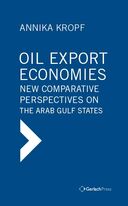
Oil Export Economies: New Comparative Perspectives on the Arab Gulf States.
with a foreword by Giacomo Luciani
Annika Kropf – 2016
Despite their commonalities, the Arab Gulf States have started economic diversification from different settings and against different political backgrounds. This book applies a multi-method approach including Qualitative Comparative Analysis (QCA) to highlight their heterogeneous economic development trajectories and to compare them to other major oil exporters. From a political economy perspective, it demonstrates how neoclassical economic theory fails to grasp the underlying mechanisms of their development. The research de...
more »
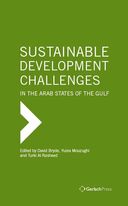
Sustainable Development Challenges in the Arab States of the Gulf
David Bryde, Yusra Mouzughi, Turki Al Rasheed (eds.) – 2015
This volume surveys the increasing challenges facing the Arab Gulf states in terms of sustainable consumption and production. Topics include: - Environmental sustainability: waste, recycling, water, energy, renewables, and pollution - Economic sustainability: employment, education, training and business engagement - Social sustainability: equality and diversity, pollution, congestion, community participation Includes contributions from specialists from the UAE, Bahrain, Lebanon, Egypt, Oman, Saudi Arabia, Morocco and Qatar a...
more »
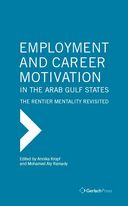
Employment and Career Motivation in the Arab Gulf States:
The Rentier Mentality Revisited
Annika Kropf, Mohamed Ramady (eds) (eds.) – 2015
The notion of “rentier mentality” has haunted the literature on the Gulf States for almost 40 years now. However, few studies have actually provided insight into how the nationals themselves perceive their career motivators, employability and productivity. The eleven studies of this book present both empirical findings and case studies that reveal what nationals expect from their workplace and what hinders them from a personal, meaningful contribution. While it seems that an initially high work motivation is often annihilate...
more »
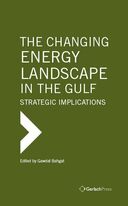
The Changing Energy Landscape in the Gulf:
Strategic Implications
Gawdat Bahgat (ed.) – 2015
Extreme fluctuations in oil prices (such as the dramatic fall from mid-2014 into 2015) raise important strategic questions for both importers and exporters. In this volume, specialists from the US, the Middle East, Europe and Asia examine the rapidly evolving dynamic in the energy landscape, including renewable and nuclear power, challenges to producers including the shale revolution, and legal issues. Each chapter provides in-depth analysis and clear policy recommendations....
more »

The United States and the Gulf:
Shifting Pressures, Strategies and Alignments
Steven W. Hook, Tim Niblock (eds.) – 2015
The Gulf region’s relations with the outside world are changing radically. The Gulf’s major trading partners are now no longer predominantly Western. China, in particular, now has a significant stake and highly critical interests in the region. The United States still dominates the security field, yet its Gulf allies have come to doubt the strength of US commitment. Meanwhile the Arab monarchies of the Gulf are struggling to cope with multiple divisions, problems and threats: the radical forces of change unleashed by the Ara...
more »
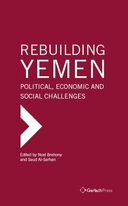
Rebuilding Yemen:
Political, Economic and Social Challenges
Noel Brehony, Saud Al-Sarhan (eds.) – 2015
As Yemenis start planning the reconstruction and rebuilding of their country after recent turmoil they face huge challenges in every major sphere. This book discusses the political and economic background and analyses the most important issues: - the option of improved governance through a federal government - addressing the powerful and patronage networks of the previous regime - investing in Yemen’s human and natural resources to compensate for falling revenues from oil and gas - maintaining rural life through reduced depe...
more »
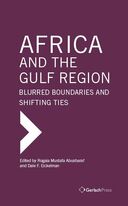
Africa and the Gulf Region:
Blurred Boundaries and Shifting Ties
Rogaia Mustafa Abusharaf, Dale F. Eickelman (eds.) – 2015
The ties that bind Africa and the Gulf region have deep historical roots that influence both what Braudel called the longue durée and the short-term events of current policy shifts, market-based economic fluctuations, and global and local political vicissitudes. This book, a collaboration of historians, political scientists, development planners, and a biomedical engineer, explores Arabian-African relationships in their many overlapping dimensions. Thus histories constructed from the “bottom up” – records of the everyday act...
more »
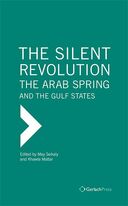
The Silent Revolution: The Arab Spring and the Gulf States
May Seikaly, Khawla Mattar (eds.) – 2014
How immune is the Gulf region to the changes that have engulfed the Arab world since 2011? This volume responds to this question by examining the impact of the Arab Spring on Gulf regimes and societies and contributing to debates on political participation and citizenship; sectarianism, gender and identity formation; as well as the role of the media in exposing the paradoxes of the Gulf system and its relationship to international political actors....
more »
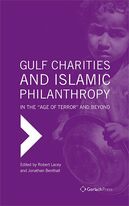
Gulf Charities and Islamic Philanthropy in the "Age of Terror" and Beyond
Robert Lacey, Jonathan Benthall (eds.) – 2014
Gulf Charities and Islamic Philanthropy in the "Age of Terror" and Beyond is the first book to be published on the charities of Saudi Arabia and the Arabian Gulf, covering their work both domestic and international. From a diversity of viewpoints, the book addresses: The historical roots of Islamic philanthropy in religious traditions and geopolitical movements The interactions of the Gulf charities with "Western" relief and development institutions - now under pressure owing to budgetary constraints Num...
more »
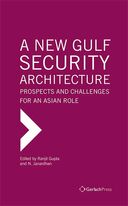
A New Gulf Security Architecture:
Prospects and Challenges for an Asian Role
Ranjit Gupta, Abubaker Bagader, Talmiz Ahmad, N. Janardhan (eds.) – 2014
This book explores how growing economic ties between Asian countries and the Gulf Cooperation Council (GCC) could impact their future relationship. It postulates that the stage is now set for strategic partnerships and highlights how some Asian countries have been explicit about showcasing their power and influence in the Gulf region. While exploring an alternative and broad-based security architecture, it identifies the challenges that any probable Asian cooperative approach could face as the countries of the Arabian Gulf s...
more »
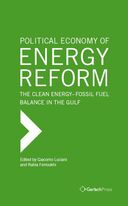
Political Economy of Energy Reform:
The Clean Energy-Fossil Fuel Balance in the Gulf States
Giacomo Luciani, Rabia Ferroukhi (eds.) – 2014
Climate change requires coordinated global responses. All nations, including major Gulf Arab oil producers, should implement policies to contain greenhouse gas (GHG) emissions. Yet all realistic scenarios point to the continuing global need for fossil fuels. The countries of the Gulf Cooperation Council (GCC) thus face a dilemma between continuing development and use of their fossil fuel endowments and increasing reliance on low carbon sources, such as nuclear, solar or wind. This book explores various facets of the dilemma....
more »
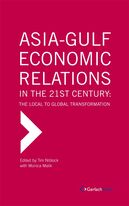
Asia-Gulf Economic Relations in the 21st Century. The Local to Global Transformation
Tim Niblock with Monica Malik (ed.) – 2013
Asia constitutes the hub of the transformation of global economic power today. The Gulf, itself part of Asia, is of increasing importance in this transformation. This book documents the growing interactions between the economies of the Gulf states and those of the rest of Asia. These relationships are critical to how the world economy develops over the next decade, and how economic (and perhaps strategic) power is distributed. This volume assembles cutting-edge thinking by 16 specialists on a wide variety of topics covering ...
more »
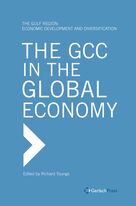
The GCC in the Global Economy
Richard Youngs (ed.) – 2013
Changing geopolitical realities have seen the Gulf region turning to Asia and Africa to build new economic links, while strengthening old ones. This proactive internationalism is visible not just in economics and energy, but also in politics and security where a host of new agreements has been developed. This work provides an overview of the ways in which the GCC states now need to move ahead with reforms that will reflect issues such as raised expectations from a period of high revenues and the region's demographics. T...
more »
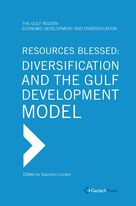
Resources Blessed: Diversification and the Gulf Development Model
Giacomo Luciani (ed.) – 2013
The Gulf countries have adopted a unique combination of policies to encourage diversification with largely positive results, while there are significant distinctions between the individual cases. This work evaluates various examples to show the extent to which the Gulf economies have diversifed to date, and how results can be measured, taking into consideration factors such as composition of GDP or exports; government services; and the categorization of industrial activities downstream of resources extraction (oil refining, ...
more »
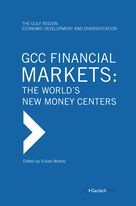
GCC Financial Markets: The World's New Money Centers
Eckart Woertz (ed.) – 2013
Bond markets in the GCC countries are underdeveloped, and the capital mix is heavily skewed towards banks, while ambitious development plans in fields like petrochemicals and infrastructure, as well as a rapidly growing population, create an increased need for finance. This study outlines the structure of various segments of GCC financial markets and points to regulatory challenges and future developments, ranging from capital market structures to the planned GCC Monetary Union, Islamic banking, and sovereign wealth funds. T...
more »
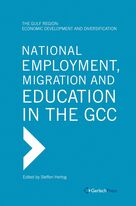
National Employment, Migration and Education in the GCC
Steffen Hertog (ed.) – 2013
This volume provides a cross-cutting analysis of the policy challenges related to GCC labor markets. It analyzes the different dimensions of segmentation of these markets, factors of change influencing labor supply such as trends in education and demography, as well as the impact of potential future reforms in areas such as immigration policy, labor sponsorship, taxation and minimum wages. The work therefore provides an overview of what arguably will be the core socio-economic challenge for the GCC in the coming years....
more »
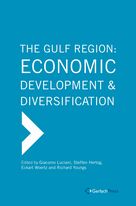
The Gulf Region: Economic Development & Diversification.
Set, Volumes 1-4
Giacomo Luciani, Steffen Hertog, Eckart Woertz, Richard Youngs (eds.) – 2012
The four volumes in this major research collection address the key economic issues which affect the future development and diversification of the member states of the Gulf Cooperation Council (GCC), namely Saudi Arabia, Kuwait, Bahrain, Qatar, UAE and Oman. Specifically, this recent research covers Economic Diversification, Development of Global Partnerships, Labor Markets and Migration, and Financial Markets as Global Players The work brings together state-of-the-art analysis by some 40 international scholars who participat...
more »



